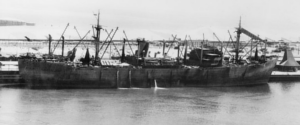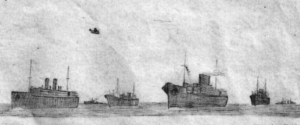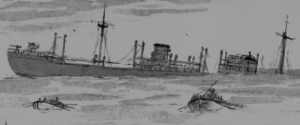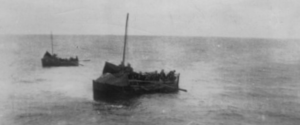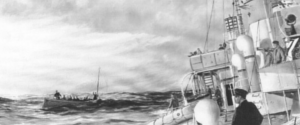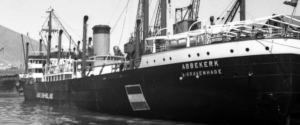
At long last we arrived in Singapore where there were already a few ships. This arrival I can remember quite well. When I stepped on deck to go and have a look at the steering machine at the stern, I just saw a fighter plane, obviously hit, falling out of the sky some sixty metres from the ship. That created a large water fountain and when that had come down the plane was nowhere to be seen. When you think about it, you see a human being killed right in front of your eyes. An Englishman, a Dutchman or a Jap? To be honest I did not give it much thought. I thought about the cargo in the ship and our absolutely hopeless position against an enormously outnumbered enemy force in the air.
As was expected we were ordered to anchor half a kilometre from any other ship and even further from the city and that was not for nothing. A well aimed bomb falling on our ship and all the other ships could go to the scrapheap. Being at anchor we decided to do no maintenance in case of a hasty departure because we did not trust the situation. This was very unusual for us because normally in every port it was all hands to the machines to do maintenance or repair work.This proved to be a good idea. On every day that followed Singapore was under aerial attack. At nine a.m.( you could set your watch by it) thirty bombers flew right above our ship on their way to bomb Singapore. In great haste the Chinese dockworkers unloaded the Spitfires into barges tied alongside our ship which then took the Chinese and aircraft ashore. Later we heard that five days after assembly they were all lost, shot down or destroyed on the ground. We could do nothing but watch the sky and wonder whether they would pick on us or go to the city again.
In the meantime all of us had a couple of snifters of the so called ‘Dutch courage’ We kept asking ourselves whether these Japs had not noticed that one ship had anchored so far from the others. Surely they were not that stupid? Stupid or not, not a single bomb came our way, but we were all stressed-out for sure.
The second day a few barges with the Chinese workers came alongside to unload our cargo.The morning bombardment of the city had just finished and these Chinese were obviously pleased to have survived unscathed; happy also to be able to work for most of the day at a fair distance from the city. This was done under supervision by a less afraid Dutchman because of the ‘Dutch courage’.
The hatches were opened by our crew while the dockworkers went down the staircases to have a look at the cargo. Often I have heard a number of Chinese talk together, but the talk of some fifty already nervous and very frightened dockworkers was something else.
It sounded to me as if a stone deaf worker would regain his hearing from the pure excitement itself. The boss of the Chinese went quickly to the Captain and let him know in perfect English that his men were not prepared to work in this warehouse of bombs and they returned straight away on one of the barges to the not so safe shore. These were the last Chinese we saw in Singapore. In my case it would be a full year before I would see one again, and that is a long time because there are many Chinese in this world.
Now we had a life-size problem. If there was anyone who wanted to get rid of this dangerous cargo it was the crew. Communication with the shore waspoor. We could only do this by going there in our motor launch. Everybody could see a mile off that there was never going to be someone to unload this dangerous cargo. Yet it was destined for Singapore, but chaos reigned all over the city. Nobody cared about any of the ships at anchor, The Japanese came closer and closer to Singapore and the English Army retreated slowly towards this city.
The captain asked the bosun if the sailors would agree to unload the bombs which were stored at the top of the cargo, onto the barges alongside. They were prepared to do this; even the English gunners volunteered to help. And so it happened that as yet, a number of bombs from every hold finished up in the barges alongside. I can not remember how long it took before the barges were full but at a guess it was two to three days. After this the Captain motored ashore to advise the shipping agent that a cargo was waiting to be towed away. This did indeed happen. I often wondered about what the agent thought about all these very unusual circumstances. We continued to stay at anchor. Every day the bombardments were getting heavier. The smoke of the fires ashore now continued to billow up all day. More and more planes were passing overhead now.
After four weeks; when the Japanese were really close, the Captain once again boarded his motor launch to go ashore, this time to make telephone contact with the Dutch government in Batavia (now called Jakarta) to report the hopeless and helpless situation of our ship. I can only presume he did as it was not his custom to discuss these matters with the crew. The result was that we could leave Singapore. The Captain made himself very popular with this action and with renewed vigour the ship was readied for sea and to steam southwards at full speed. If we had had paddles we would all have helped to speed the ship along and away from Singapore.
<< previous chapter ———————————————————————–next chapter >>

